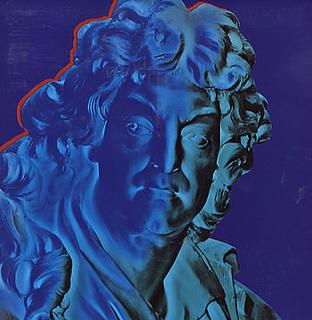A remix is an alternative version of a recorded work.
Contents
Remix or The Remix may also refer to:
A remix is an alternative version of a recorded work.
Remix or The Remix may also refer to:
Up or UP may refer to:
Imagine may refer to:
A remix is a piece of media which has been altered or contorted from its original state by adding, removing, or changing pieces of the item. A song, piece of artwork, book, poem, or photograph can all be remixes. The only characteristic of a remix is that it appropriates and changes other materials to create something new.
Mix, MIX, mixes, or mixing may refer to:
Zero is both the digit 0 and the number 0.
Raymond Watts is an English musician, the founding and sole member of the industrial music project PIG, sometimes written as <PIG>.
Next may refer to:
A hero is somebody who performs great and noble deeds of bravery.
A robot is a virtual or mechanical artificial agent, usually an electro-mechanical machine.
Red is a color.
Candy is a type of sweet confectionery, typically prepared by dissolving sugar in water or milk and boiling it to concentrate the sugar.

Remix culture, also known as read-write culture, is a term describing a culture that allows and encourages the creation of derivative works by combining or editing existing materials. Remix cultures are permissive of efforts to improve upon, change, integrate, or otherwise remix the work of other creators. While combining elements has always been a common practice of artists of all domains throughout human history, the growth of exclusive copyright restrictions in the last several decades limits this practice more and more by the legal chilling effect. In reaction, Harvard law professor Lawrence Lessig, who considers remixing a desirable concept for human creativity, has worked since the early 2000s on a transfer of the remixing concept into the digital age. Lessig founded the Creative Commons in 2001, which released a variety of licenses as tools to promote remix culture, as remixing is legally hindered by the default exclusive copyright regime applied currently on intellectual property. The remix culture for cultural works is related to and inspired by the earlier Free and open-source software for software movement, which encourages the reuse and remixing of software works.

Stuart David Price is an English electronic musician, DJ, songwriter, and record producer. His acts include his own band Zoot Woman, Les Rythmes Digitales, Paper Faces, Man with Guitar, Thin White Duke, and the parodic French moniker Jacques Lu Cont.

r.e.m.IX is a 2002 remix album of songs by R.E.M. from its 2001 album Reveal. Copies of that album were given to well-known remixers to see what they could do with its tracks and the band's favorite results were compiled to form this album. Out of the twelve original tracks on Reveal, six are found among the ten tracks on this album—there are two different versions of "The Lifting" and four of "I've Been High." "I'll Take the Rain" was the only one of Reveals three singles to be included on r.e.m.IX.

"Round & Round" is a song by the English band New Order from their fifth studio album Technique (1989). The song was written by band members Gillian Gilbert, Peter Hook, Stephen Morris and Bernard Sumner, and the album version was produced entirely by New Order. "Round & Round" was re-recorded for a single release, with Stephen Hague as co-producer.

"Paninaro" is a song by English synth-pop duo Pet Shop Boys, originally a B-side to the 1986 single "Suburbia". In 1995, a re-recording titled "Paninaro '95" was released to a wider market, to promote the duo's B-side compilation album Alternative, though only the original version was included on the compilation.
Philip Steir is an American drummer, remixer, composer and record producer.
Wings are appendages used to create lift.

Face Up is the fifth solo studio album by British singer Lisa Stansfield, released by Arista Records on 20 June 2001. It was her first new studio album since 1997's Lisa Stansfield. Stansfield co-wrote songs for the album with her husband Ian Devaney and Richard Darbyshire. Devaney also produced all the tracks. Face Up garnered favorable reviews from music critics who praised the funky and soul songs and also the adventurous usage of 2-step garage beats in the first single, "Let's Just Call It Love". The disco-flavored "8-3-1", selected as the second single, was withdrawn at the last minute. Face Up was released in Europe and Japan, and performed moderately on the charts reaching top forty in the European countries. Face Up was re-released as a deluxe 2CD + DVD set in the United Kingdom on 10 November 2014 and in Europe on 21 November 2014.

OverClocked ReMix, also known as OC ReMix and OCR, is a non-commercial organization dedicated to preserving and paying tribute to video game music through arranging and re-interpreting the songs, both with new technology and software and by various traditional means. The primary focus of OC ReMix is its website, ocremix.org, which freely hosts over 4,000 curated fan-made video game music arrangements, information on game music and composers, and resources for aspiring artists. In addition to the individual works, called "ReMixes", the site hosts over 70 albums of music, including both albums of arrangements centered on a particular video game, series, or theme, and albums of original compositions for video games. The OC ReMix community created the Super Street Fighter II Turbo HD Remix soundtrack for Capcom in 2008, and began publishing commercially licensed arrangement albums in 2013.